Apple Cider Vinegar for Hair: Does it work?

Apple cider vinegar (ACV) has become a popular natural remedy for improving hair health, praised for its ability to balance scalp pH, remove buildup, and boost shine.
But does it work? This article’ll explore the science behind ACV’s benefits, potential side effects, and how to use it effectively.
Whether you’re looking to combat dandruff, tame frizz, or achieve healthier hair, we’ll uncover whether this kitchen staple lives up to the hype.
Discover if apple cider vinegar rinse is the right addition to your hair care routine.
- Is apple cider vinegar good for your hair?
- Benefits
- How to make your apple cider vinegar
- Side effects
- How to use
- Alternatives
Is apple cider vinegar good for your hair?
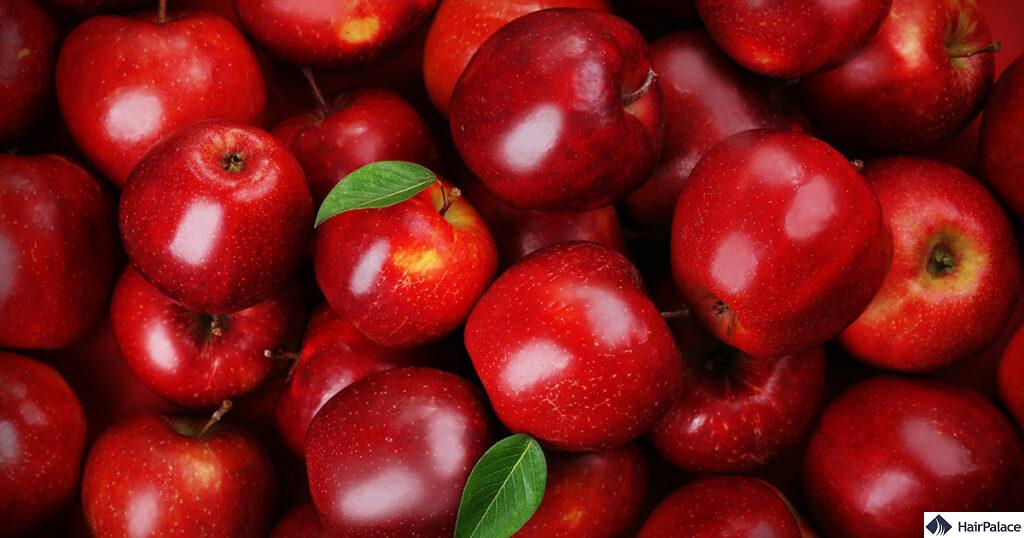
Apple cider vinegar is a natural remedy that offers a wide range of benefits for hair health.
Known for its slightly acidic pH, ACV helps restore the natural pH balance of the scalp and hair, which can become disrupted by alkaline hair products.
This balance minimizes frizz, reduces dryness, and leaves hair feeling smoother.
ACV is also a natural clarifying agent, effectively removing product buildup, excess oil, and impurities without the harshness of chemical cleansers.
Its antimicrobial properties make it beneficial for soothing itchy scalps and combating dandruff caused by bacteria or fungi.
Additionally, apple cider vinegar seals the hair cuticle, improving shine and making hair easier to detangle.
ACV indirectly supports stronger, healthier hair growth by promoting a clean, healthy scalp environment.
Apple cider vinegar benefits for hair

Here are the main benefits of using apple cider vinegar rinse on hair:
- Restores pH Balance: Helps maintain the natural pH of your hair and scalp, reducing frizz and preventing dryness.
- Reduces Dandruff: Its antifungal and antibacterial properties combat dandruff-causing bacteria and fungi.
- Clarifies Hair: Removes product buildup, excess oil, and impurities, leaving hair clean and light.
- Improves Hair Shine: Smooths the hair cuticle, making it reflect light better for a shinier appearance.
- Detangles Hair: ACV’s acidity smooths the cuticle, reducing knots and making hair easier to manage.
- Reduces Frizz: Seals the hair cuticle, preventing moisture from escaping and reducing frizz.
- Soothes Itchy Scalp: Alleviates itchiness and irritation by cleansing and balancing the scalp.
- Promotes Hair Growth: By improving scalp health and circulation, ACV may indirectly support healthier hair growth.
- Prevents Split Ends: Smoothing the cuticle helps prevent dryness and split ends.
- Controls Excess Oil: Regulates oil production on the scalp, preventing hair from becoming greasy too quickly.
- Supports Scalp Health: ACV’s antimicrobial properties can help maintain a healthy scalp.
- Gentle Exfoliation: Removes dead skin cells and unclogs hair follicles for better scalp and hair health.
How to make your apple cider vinegar for hair at home
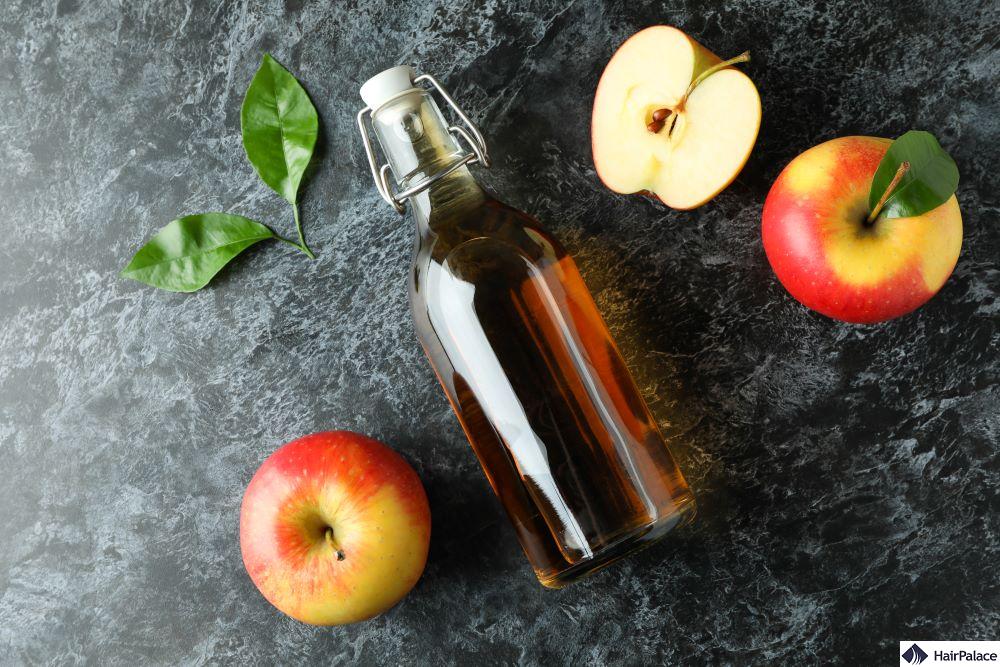
Making apple cider vinegar at home is simple and requires just a few ingredients and patience.
You will need apple scraps and 1-2 tablespoons of sugar, filtered water, a large glass jar and cheesecloth or a clean breathable cloth along with a rubber band or string.
Steps:
- Prepare Apple Scraps: Use peels, cores, or chopped apples. Avoid using spoiled or moldy fruit.
- Add to Jar: Place the apple scraps in a clean glass jar. Fill the jar about ¾ full to leave space for fermentation.
- Dissolve Sugar: If using sugar, dissolve it in a cup of warm filtered water. Pour the sugar water over the apple scraps. Then, add more water to cover the apples fully. Ensure all the scraps are submerged to prevent mold growth.
- Cover the Jar: Cover the jar with cheesecloth or a clean breathable cloth, securing it with a rubber band or string. This allows air circulation while keeping dust and insects out.
- Ferment: Place the jar in a dark, cool area (about 20–25°C or 68–77°F). Stir the mixture daily to prevent mold and ensure even fermentation. After 1–2 weeks, you’ll notice bubbling, indicating fermentation.
- Strain the Mixture: After 2 weeks, strain the liquid to remove the apple solids. Pour the liquid back into the jar.
- Develop Acidity: Let the strained liquid ferment for another 2–4 weeks. Stir or swirl the jar occasionally. During this time, the vinegar will develop its characteristic tangy smell and flavour.
- Taste Test: After 4–6 weeks total, taste the vinegar. When it has reached your desired acidity, it’s ready. Transfer it to a clean, airtight bottle for storage.
Dilute 1–2 tablespoons of your homemade apple cider vinegar in 1 cup of water before applying the ACV rinse.
For the best results, you should use organic apples, and make sure the scraps remain submerged to avoid spoilage.
Store the finished ACV in a cool, dark place. It doesn’t require refrigeration.
Washing hair with apple cider vinegar side effects
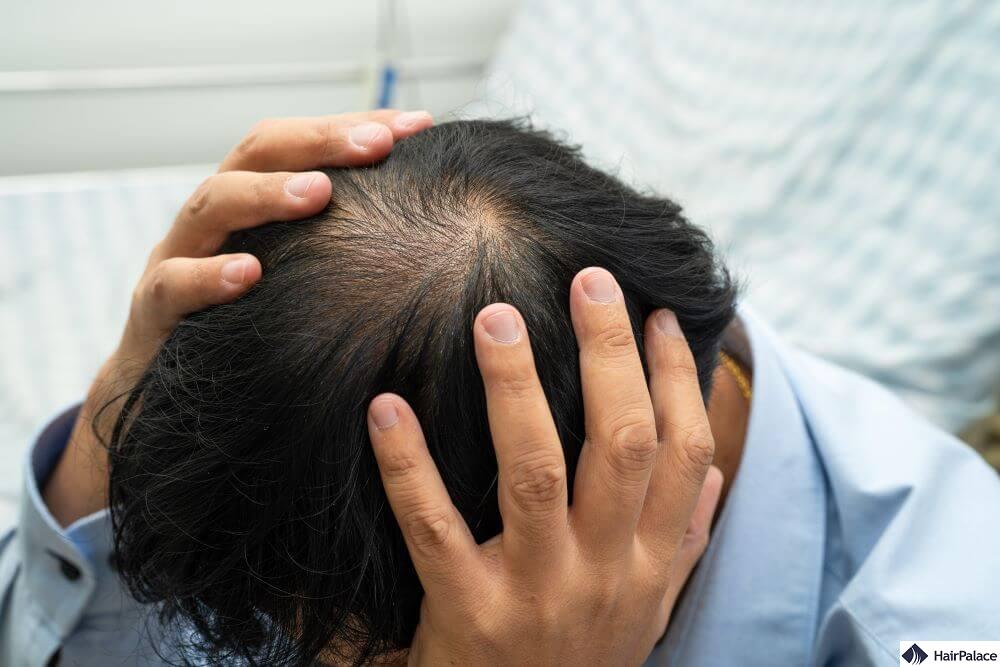
Washing hair with apple cider vinegar can provide many benefits, but there are potential side effects, especially if it’s not used properly.
- Scalp Irritation: ACV’s acidic nature can irritate sensitive or broken skin.
- Dryness and Brittleness: Overuse can strip natural oils from the hair, leading to dryness.
- Hair Color Fading: ACV may lighten hair slightly over time, especially if used frequently.
- Strong Odor: The vinegar smell can linger in the hair if not rinsed thoroughly.
- Eye Irritation: ACV can sting if it comes into contact with the eyes.
- Scalp Sensitivity: Frequent use may make the scalp more sensitive over time.
- Potential Allergic Reaction: Although rare, some people may have an allergic reaction.
- Increased Frizz for Some Hair Types: If the hair cuticle doesn’t respond well to the acidic pH, it can lead to frizz instead of smoothing.
How to minimize risks
To minimize risks when using apple cider vinegar on your hair, always dilute it with water to reduce its acidity. Typically, you mix 1–2 tablespoons of apple cider vinegar with 1 cup of water.
Perform a patch test on your skin to check for sensitivity before full application, especially if you have a sensitive scalp or skin condition.
Limit usage to 1–2 times per week, as overuse can strip natural oils and lead to dryness or irritation.
Avoid applying apple cider vinegar to broken or irritated skin, and ensure it doesn’t come into contact with your eyes.
Thoroughly rinse your hair with cool or lukewarm water after application to prevent residue or lingering odour.
Adding a few drops of essential oil like lavender or tea tree can enhance the rinse while masking the vinegar smell.
Lastly, observe how your hair and scalp respond and adjust the frequency or dilution to suit your needs.
How to use apple cider vinegar on hair
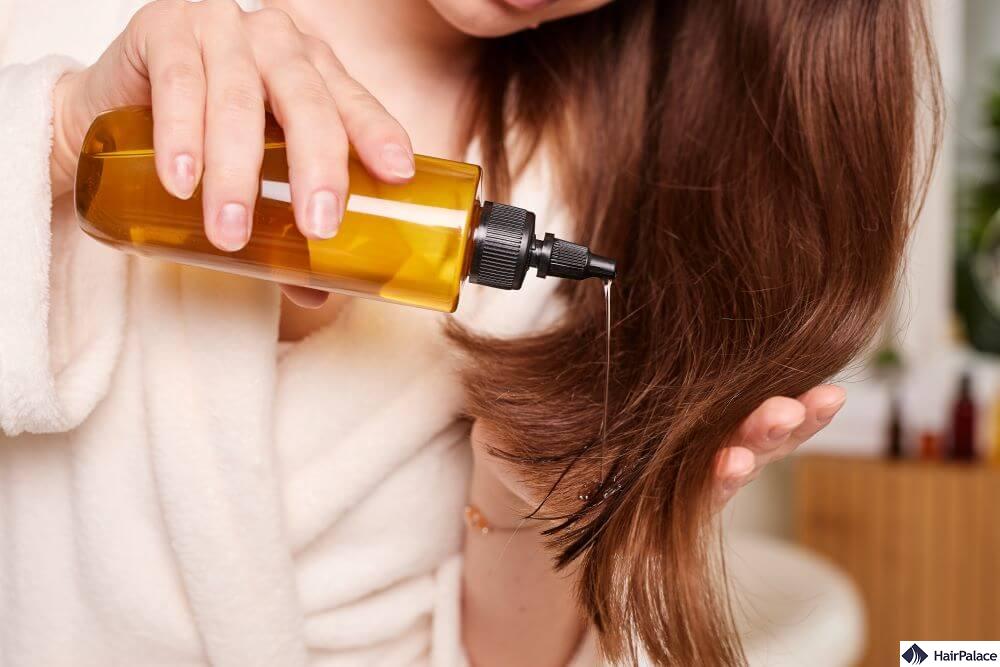
Using apple cider vinegar on your hair can promote scalp health, shine, and manageability. Let’s see how to do it safely and effectively.
Steps to Use Apple Cider Vinegar on Hair
Mix 1–2 tablespoons of ACV with 1 cup of water. Adjust the ratio based on your hair type.
Use 2 tablespoons for oily hair, and 1 tablespoon for dry or sensitive scalp.
Follow this up by washing your hair with your regular shampoo and rinse thoroughly.
Next, you should apply the apple cider vinegar hair rinse. You have two options here:
- Option 1 (Spray Bottle): Pour the ACV mixture into a spray bottle, spritzing evenly onto your scalp and hair.
- Option 2 (Cup Method): Slowly pour the mixture over your hair and scalp, ensuring all areas are covered.
Gently massage your scalp for a minute to distribute the rinse and promote circulation.
Leave apple cider vinegar on your hair for 2–5 minutes. This allows the vinegar to work its magic.
Rinse thoroughly with cool or lukewarm water. The cool water helps seal the hair cuticle for added shine.
If your hair feels dry, follow up with a light conditioner, especially on the ends.
How Often to Use:
If you have normal or just slightly oily hair you should aim to use apple cider vinegar 1 or 2 times a week.
However, if your scalp is dry or sensitive you should only use it once every 1-2 weeks.
Expert tips for the best results

You should always adjust the dilution ratio to suit your hair type and scalp sensitivity.
Spice up your recipe with a few drops of essential oil such as rosemary or rosehip to reduce the vinegar smell.
Make sure you test a small amount on your skin before full application to ensure no irritation.
Lastly, and most importantly, use the rinse regularly but avoid overuse to prevent dryness.
By incorporating ACV rinses into your hair care routine, you can enjoy shinier, healthier hair with improved scalp health.
What to do in case apple cider is not enough
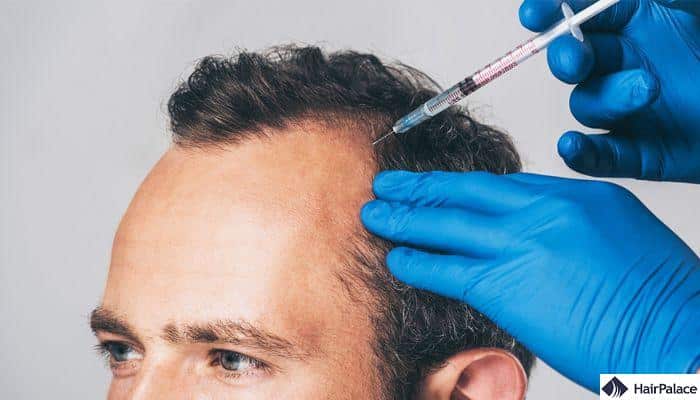
If apple cider vinegar (ACV) is not addressing your hair concerns adequately, consider the following alternatives and complementary solutions:
- Shampoos: Look for products specifically designed against hair loss, such as ketoconazole shampoo.
- Minoxidil (Rogaine): FDA-approved topical treatment available in 2% and 5% strengths for stimulating hair regrowth and slowing hair thinning.
- Finasteride (Propecia): FDA-approved oral medication that blocks DHT, a hormone associated with hair loss, effective for male pattern baldness.
- Hair Transplant: Using the latest FUE method individual hair follicles are extracted and implanted, leaving minimal scarring.
- PRP: A patient’s blood is drawn, processed to extract platelets, and injected into the scalp to stimulate hair follicles.
- Low-Level Laser Therapy (LLT): Laser caps, combs, or helmets that use light therapy to stimulate hair follicles and improve hair density.
- Scalp Micropigmentation (SMP): A non-surgical cosmetic tattooing technique that creates the appearance of fuller hair or a shaved scalp.
- Essential oils: Essential oils, such as lavender, and peppermint, are commonly used in hair care to promote growth. Other oils such as marula oil for hair might also provide benefits.
Last medically reviewed on December 20th, 2024
- D’Souza P, et al. (2015). Shampoo and conditioners: What a dermatologist should know?https://www.ncbi.nlm.nih.gov/pmc/articles/PMC4458934/
- Yagnik D, et al. (2018). Antimicrobial activity of apple cider vinegar against Escherichia coli, Staphylococcus aureus and Candida albicans; downregulating cytokine and microbial protein expression.https://www.ncbi.nlm.nih.gov/pmc/articles/PMC5788933/
- Johnston CS, Gaas CA. Vinegar: medicinal uses and antiglycemic effect. MedGenMed 2006; 8: 61.https://onlinelibrary.wiley.com/servlet/linkout?suffix=null&dbid=8&doi=10.1111%2Fijd.15804&key=16926800&getFTLinkType=true&doiForPubOfPage=10.1111%2Fijd.15804&refDoi=e_1_2_14_2_1%3APMID&linkType=PMID&linkSource=FULL_TEXT&linkLocation=Reference


